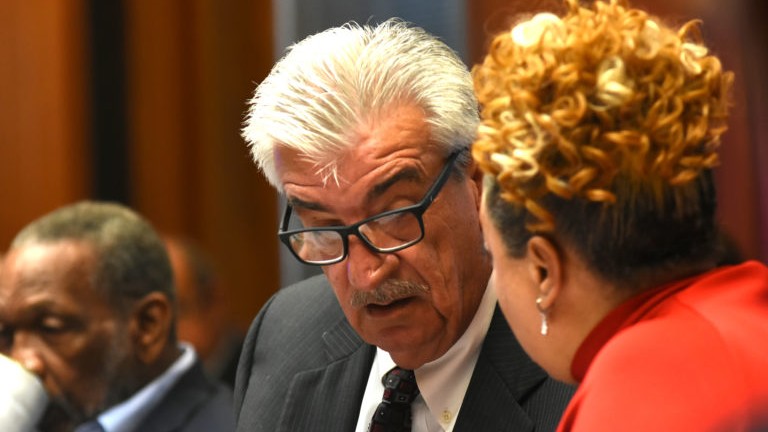By Solomon Crenshaw Jr.
The Jefferson County Commission recently passed a budget of more than $700 million for fiscal 2020.
The action completed a budget process that finance committee chairman Joe Knight called “horrendous.” He followed the passing of the budget – on a 3-2 vote with Knight voting with Commissioners Lashunda Scales and Sheila Tyson – by presenting an administrative order to revamp the procedure for future budgets.
“There are some good things that got done,” Knight said. “I want this to be a commission of five. I’m tired of the 3-2, the yeah-yeah, the politics. I want to be fair. I want to be across the board. I want everybody to be treated fairly … A lot of contention was commission support and the items we’re calling pork. I would like to have had an itemization of who supports what but we didn’t get there. That’s OK.”
Commissioners met first in committee and then in a contentious regular meeting to hammer out the budget. Commission President Jimmie Stephens argued that the budget should be sent back to committee for further work.
“We’ve got two months to properly work together and get a good budget,” Stephens said.
Scales disagreed, saying, “No, Mr. President, we’ve got today.”
Commissioner Steve Ammons moved in committee that the budget not go to the commission agenda but instead be reconsidered in committee. That effort failed, with Ammons and Stephens casting the dissenting votes.
Ultimately, Tyson moved that the budget go to the full agenda, and Scales provided a second. The two former Birmingham City Council members voted in favor, along with Knight.
Debate Over $1.2 Million in Public Service Funds
The greatest debate over the $700,263,145 budget involved $1,225,000 in public service funds. Those funds included $200,000 for events related to the Magic City Classic that pits the football teams of Alabama State and Alabama A&M universities against one another, $250,000 for the Birmingham Jefferson County Transit Authority, $15,000 for the Martin Luther King Breakfast, $50,000 for a STEM program, $25,000 for the Sidewalk Film Festival and $25,000 for the Red Mountain Theater. Also, $1.25 million was set aside to assist people who struggle to pay rising sewer bills caused by the county’s settlement to escape bankruptcy.
Scales called the budget passed today inclusive, fair and balanced.
“I think today represented all of Jefferson County, and I think the budget reflected as much,” she said. “The Sewer Assistance Fund is not a fund. All we’re doing is earmarking money that would benefit any resident of Jefferson County who has an issue with paying their sewer bill.”
A nonprofit must be targeted to administer the money, and criteria to apply for the funds must be established.
“I think today was a winner for citizens,” Scales said.
Changes in Process for Next Budget
Ammons said he felt commissioners “could have gone through a better process.”
“The administrative order that Commissioner Knight brought forward today … I think is a great, great step forward as we move into next year’s budget, for ‘21,” Ammons said.
The first-year Republican commissioner said he had concerns about some elements of the budget.
“The Magic City Classic or the MLK Breakfast … I’m not necessarily against, I just have questions, and those questions didn’t get answered,” he said. “There were items I thought belonged in district discretionary funds, to come out of those.”
Former commissioner David Carrington brought heightened attention to today’s budget vote with a letter to current commissioners. He expressed concern in that letter over the sewer relief fund, saying money from that fund will be challenged in court.
“I can give you a 100 percent probability that will be the case,” he said. He said one thing the county learned from the sewer issue was “how to make a lot of lawyers rich.”
But Scales cites House Bill 573, which was approved by the Legislature and signed by the governor in 2015, as validation that setting aside money for a sewer-assistance fund is legal. The law allows funding “to support publicly available assistance programs established for the benefit of low income residential customers of the county’s public sanitary sewer system.”

